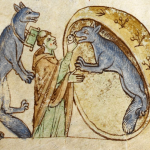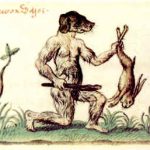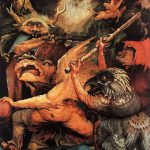Name : lupo manero or benandanti for people who permanently become wolves and fight witches in the underworld
Origin : Magic

Cause : Italian peasants still say a man who sleeps outdoors on Friday under a full moon will be attacked by a werewolf, or will become one himself. Friday was the night of the Goddess, and the warning against her lunar influence probably dated back to the myth of Endymion.
In Abruzzi was believed that the lupemenare was born on Christmas night: if it was male he would become a wolf mannaro and if it was female, a witch. In order to avoid this, for three consecutive nights at the birth, the priest must make a small cross with a sharp tip on the foot of the child.
In the late nineteenth century in the region of Abruzzo, Antonio de Nino picked up a legend that St. Rainero de Baño induces a lupemenare to return an abducted child, playing a bell and reciting:
“With the sound of my bell, can not be here, lupemenare, poisonous snake nor angry water.”
In his Bucolic, Virgil tells about a woman gifted with the ability to transform herself into wolf through the use of filters and magic and in the Aeneid relates the existence of men turned into wolves, bears and lions by the sorceress Circe.
In the Satyricon, Petronius tells the transformation of a soldier into a wolf on a night of full moon, his clothes turned into stone as he got into the woods. In other parts of Europe are also versions of werewolves.








